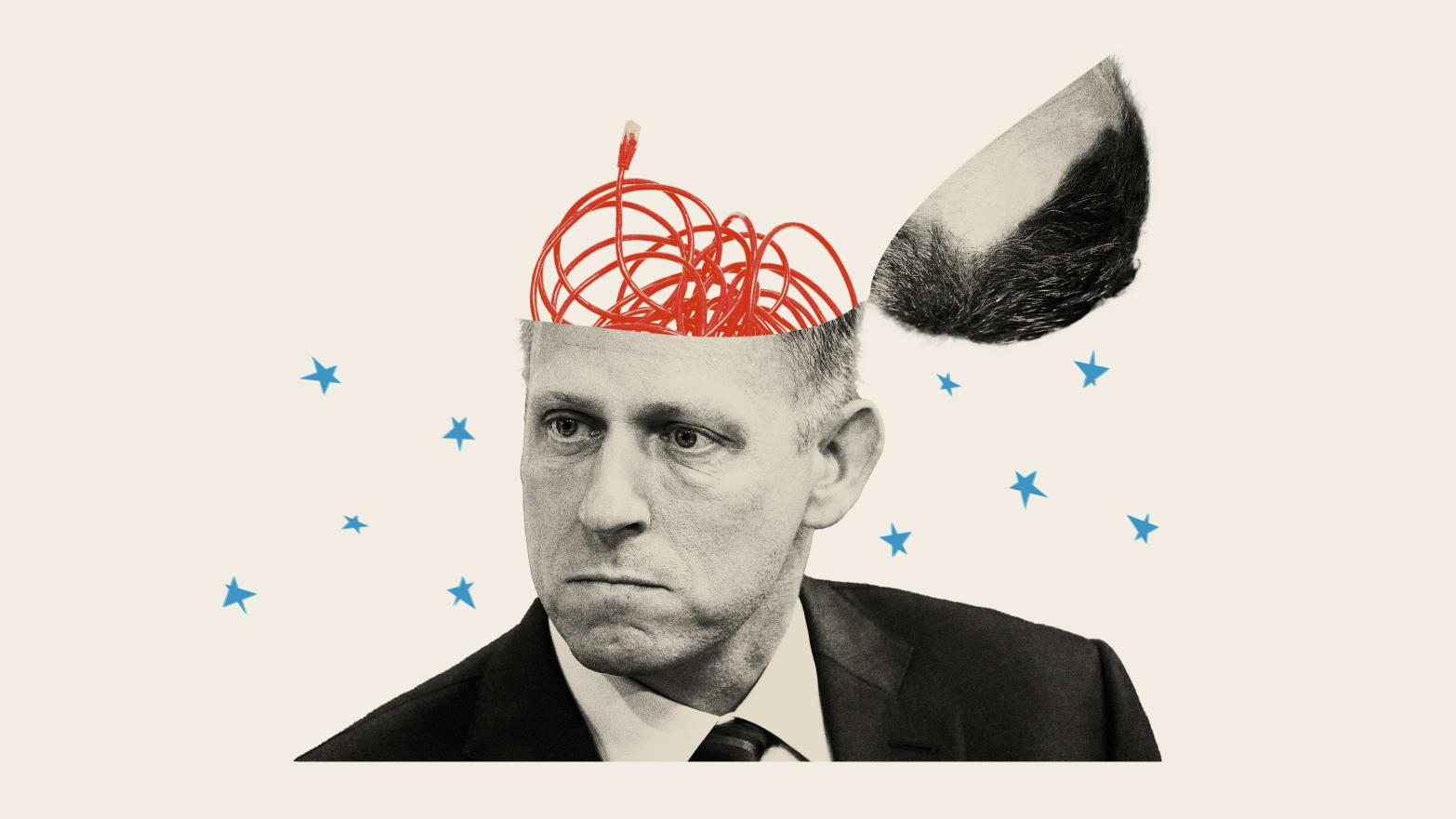Louis Anslow
Peter Thiel’s Candidates Are More Unabomber Than Tech Bro
The right-wing tech billionaire is supporting a Luddite caucus of campaigns that scapegoat modern innovations

In March 2022, Arizona Senate candidate Blake Masters was asked to name an ideological influence. Rather than answering Ayn Rand or French philosopher René Girard (a favorite of Masters’ benefactor, tech billionaire Peter Thiel), Masters cited Ted Kaczynski.
Yes, that would be the same guy who murdered strangers through the mail as the so-called “Unabomber.”
His answer caught many off guard. Why would a technology venture capitalist who co-authored a book about building the future cite a Luddite terrorist? It was, however, a fittingly heterodox paradox for a member of the Thielverse.
Just like his patron, Masters has aligned himself with a seemingly antithetical figure in his pursuit of political power. Kaczynski was a reactionary—a trait seemingly more important to Masters than attitudes towards technology. Though confusing, Masters’ endorsement and adoption of his rhetoric (along with other Thiel surrogates) weirdly makes sense.
Ted Kaczynski was not a hippie who broke bad, as some assume, and his manifesto wasn’t some extremist interpretation of 1960s whole earth environmentalism. Anyone who has bothered to read even just the first few pages of his manifesto will know that Kaczynski was a fanatical culture warrior and reactionary conservative, both socially and technologically.
While mainstream conservatives fretted about feminism and multiculturalism, seeing them as left-wing ideological constructs (as Thiel argued in the 1995 book he co-authored The Diversity Myth), Kaczynski focused more on technological progress as the mother of these movements. To him, political correctness was an aberration of modern life, the outgrowth of not independently meeting our core human needs. He posited that technology inevitably becomes a tool for authoritarian, communist central planners and that, consequently, technology and freedom were mutually exclusive.
Whether it is the scourge of political correctness, the threat of “woke” Big Tech or the rise of the technologically savvy Chinese Communist Party—you can probably see why parts of Kaczynski’s manifesto have resonated in the Thielverse. On the other hand, Kaczynski’s core macro thesis directly conflicts with Thiel’s, who in his infamous 2009 Cato Unbound essay on seasteading (which imagines a no-government libertarian utopian society on boats and man-made islands) stated “we’re in a deadly race between politics and technology” and that our fate may “depend on the effort of a single individual that builds and propagates the machine of freedom.”
This diametrically opposed thesis, which more broadly posits that technological stagnation leads to societal conflict, is something Thiel continues to expound, most recently blaming it for the “political madness” of our times.
This begs the question: Why do Thiel’s political surrogates seem to be running on a platform of neo-luddite populism? They’re contributing to the political madness, rather than selling solutions to the stagnation which caused it.

Aside from his explicit endorsement of Ted Kaczynski, Masters also recently lamented automated checkout machines, demanding we “bring back humans” and ignoring the increased demand and employment in food preparation it has created. Masters also opposed COVID-19 vaccine mandates—which isn’t necessarily anti-vaccine when argued from a libertarian perspective—but went further, labeling them “evil.” He came out against abortion, a medical procedure he once supported. He appeared to blame a school shooting on anti-depressants. He called out search engine rankings on Tucker Carlson (who has also positively cited the Unabomber), seeming to forget the point of search engines is ranked results.
“By eschewing optimism and embracing neo-luddite narratives, Thiel and his acolytes are missing a big political opportunity to move the Republican political narrative in a new direction.”
Masters isn’t an outlier in his neo-Luddite rhetoric. J.D. Vance—another Thiel surrogate running for Senate in Ohio—wants to ban pornography to “save” families. Texas Sen. Ted Cruz—a long-time Thiel patronee—blamed mass shootings on modern innovations like video games and prescription drugs. Cruz in the past has also attacked encryption, a technology that is key to protecting individuals from surveillance, and which has long been under assault by well-meaning technophobes. Missouri Sen. Josh Hawley—still another candidate in Thiel’s orbit—called for Chinese Communist Party-style time limits on social media—a bizarre level of government overreach—while also warning of the CCP’s influence over TikTok.
The notion that technology is both a tool for communist control and the root of society's evils is Kaczynski-esque, and a common theme among Thiel’s political surrogates. That Masters would cite him directly suggests these similarities may be more than a coincidence. Even Thiel himself has floated similar ideas, most notably in 2018 when he said, “AI (artificial intelligence) is communist. Crypto is libertarian.” Then in 2021, Thiel wondered whether perhaps bitcoin may be a communist tool, too.
The rhetoric of Thiel’s political protégés—whether calculating kayfabe, sincere or a bit of both—is an iteration of a political movement. It’s Trumpism with a dash of Kaczynski, a 1 to n political innovation. Ironically, it’s the kind of underwhelming iterative change Masters and Thiel warn against in their book Zero to One: Notes on Startups or How to Build the Future.
The populist right sees “American carnage” rather than “American innovation.” And it’s part of the reason neo-Luddism—rather than tech-progressivism—has been the Thielverse’s political rhetoric of choice. It’s almost certainly rooted in Thiel’s pessimism about optimism. Thiel told Mitt Romney in 2016: “I think the most pessimistic candidate is going to win, because if you are too optimistic it suggests you are out of touch.”
He was right then, as a political prognosticator, but that doesn’t mean he’s right now.
By eschewing optimism and embracing neo-Luddite narratives, Thiel and his acolytes are missing a big political opportunity to move the Republican political narrative in a new direction. They could, if they so chose, work to end the “political insanity” and zero-sum battles borne of mimetic conflict, wrought by technological stagnation. They’re forgetting that just as the next Mark Zuckerberg won’t build a social network (to paraphrase Zero to One) the next Donald Trump won’t build a wall. The next breakout Republican firebrand will build something new, fresh, and strange. Instead, they’re doing… this.
Masters and Vance, especially, had painfully obvious opportunities to forge an alternative path to political appeal, framed through the lens of technological progress. But only on the issues of cryptocurrencies and nuclear power did they take this approach. Regarding the latter, they took on the undeniable failing of the progressive environmental movement, whose anti-nuclear Luddism led directly to more fossil fuels being burned, and contributes to increased climate change today.

The college issue was another obvious opportunity, one with which Masters has experience stemming from his time running the Thiel Fellowship (a philanthropic effort that questioned the value of college by paying kids to drop out and become entrepreneurs). Masters, in particular, could have spent political energy pointing out that higher education in America is a system that Democrats want to fully subsidize, but is also the kind of faux meritocracy the left abhors, perpetuating the sort of systematic discrimination they decry.
Employers’ screening for a diploma excludes nearly 80 percent of Latinos, close to 70 percent of African-Americans, and 70 percent of rural Americans (the very demographic JD Vance needs to win a Senate seat.)
The opportunity to offer something less stale than “BUILD A WALL!” (and less divisive), all while appealing to minority swing voters, went ignored. Instead of taking on the hiring credential oligopoly and offering new tech-enabled paths to employment that don’t favor Democrats, Masters instead blamed Black people for gun violence, and along with Vance promoted the racist “great replacement theory.” Both continue to tout Trump’s border wall as a solution to opportunity in a world where employment and location are becoming increasingly untethered.
Foreign policy saw a similar squandering of opportunity, but offered some substantial self-owns. Rather than saying “Who cares about Ukrainians,” JD Vance could have hailed a new era of warfare, where cheap drones beat expensive tanks—and where leading and defending the free world doesn’t inevitably mean a ballooning deficit and increase in America’s overseas military presence.
Instead of blaming gun violence on anti-depressants, they could have blamed mental health and FDA-erected barriers to medication access. This would have doubled as a way to protect access to abortion—a popular but outwardly unspoken issue among Republican women—without having to step into politically divisive grounds.
If Peter Thiel’s political influence operation was more technologically progressive, perhaps he’d be lobbying Florida Gov. Ron DeSantis to not remove Disney’s jurisdiction over Reedy Creek Improvement District, the location for Disney’s dormant project for afuturistic city: EPCOT. This would be the kind of corporate sovereignty and futuristic industrialism Thiel said was only possible on platforms built in international waters in his aforementioned Cato Unbound essay.
For every issue borne of scarcity, tech-progressivism offers a third way—a purple pill as an alternative to the usual red and blue. Something less divisive, more constructive and more progressive.
It won’t be clear until November if Thiel’s pessimism about optimism (and pandering to luddite populism) will succeed or, rather, deliver lackluster results and cost him the political influence he desires. Whether it does or not, could depend on Democrats—and some Republicans—seizing the political opportunity of an optimistic tech-progressive platform.
